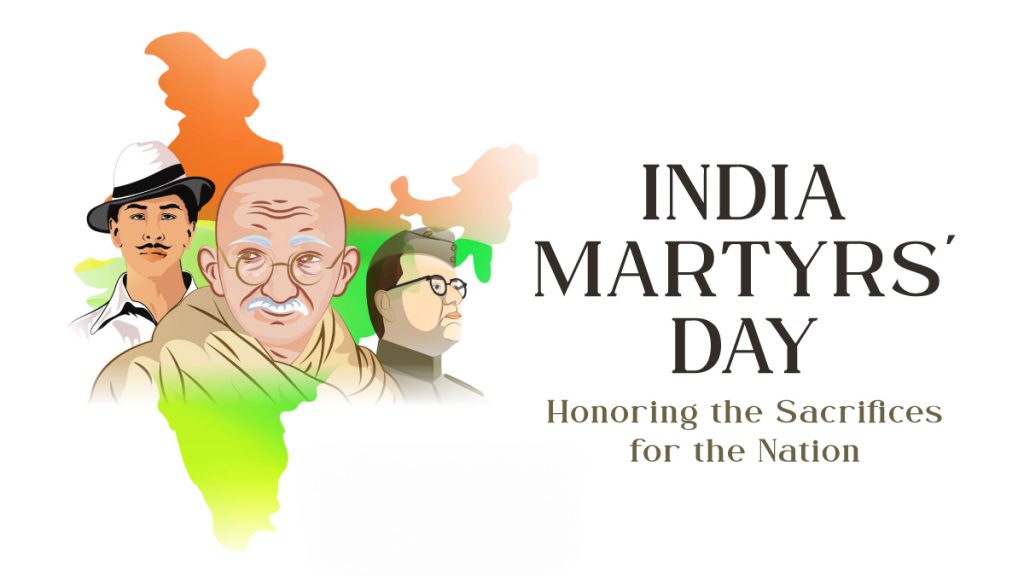Martyrs’ Day, observed on 30th January and 23rd March, is a solemn day dedicated to honoring the memory of those who sacrificed their lives for India’s freedom and independence. These dates mark the assassination of Mahatma Gandhi and the execution of Bhagat Singh, Rajguru, and Sukhdev. India observes several Martyrs’ Days throughout the year to remember freedom fighters and soldiers who laid down their lives for the nation.
Table of Contents
Martyrs’ Day Dates for 2024, 2025, and 2026
| Year | Date | Day | Occasion |
|---|---|---|---|
| 2024 | 30th January | Tuesday | Assassination of Mahatma Gandhi (1948) |
| 2025 | 23rd March | Sunday | Execution of Bhagat Singh, Rajguru, and Sukhdev (1931) |
| 2026 | 30th January | Friday | Assassination of Mahatma Gandhi (1948) |
What is Martyrs’ Day?
Martyrs’ Day is a day of remembrance and tribute to the countless individuals who gave their lives for the cause of India’s independence and defense of the nation. The most widely observed Martyrs’ Days are 30th January, marking the assassination of Mahatma Gandhi, and 23rd March, commemorating the hanging of freedom fighters Bhagat Singh, Rajguru, and Sukhdev.
On these days, the nation pays homage to the sacrifices made by these great leaders and many others who fought for India’s freedom from colonial rule. Martyrs’ Day is also an opportunity to honor soldiers who have given their lives defending the country.
Significance of Martyrs’ Day in India
Martyrs’ Day holds profound significance for the people of India as it symbolizes the spirit of selflessness, patriotism, and the ultimate sacrifice made by those who fought for freedom and justice. Here’s why the day is important:
- Honoring Freedom Fighters:
Martyrs’ Day commemorates the sacrifices made by India’s freedom fighters, particularly Mahatma Gandhi, Bhagat Singh, Rajguru, and Sukhdev, who laid down their lives for the nation’s independence. - Remembrance of Sacrifice:
The day serves as a reminder of the sacrifices made by countless individuals who gave up their lives for the greater cause of India’s independence and defense. It is a time to reflect on their bravery, dedication, and unwavering commitment to the nation. - Promotion of National Unity:
Martyrs’ Day fosters a sense of national unity and pride. It encourages citizens to remember the struggles faced by their ancestors and reinforces the importance of protecting the values of freedom, justice, and equality.
How Martyrs’ Day is Observed
Martyrs’ Day is observed with solemnity and respect across India. Various activities and events are organized to honor the martyrs and reflect on their contributions. Here’s how the day is typically observed:
- Two-Minute Silence:
On 30th January, a two-minute silence is observed across the country at 11:00 AM to honor Mahatma Gandhi and all martyrs who gave their lives for the nation. This moment of silence is observed in schools, government offices, and public spaces as a mark of respect. - Wreath Laying Ceremonies:
Ceremonies are held at memorials and statues of freedom fighters, including at Raj Ghat in New Delhi, where Mahatma Gandhi was cremated. Leaders, officials, and citizens gather to lay wreaths and pay tribute to the martyrs. - Tributes and Speeches:
Government officials, political leaders, and prominent figures deliver speeches remembering the martyrs and highlighting the importance of their sacrifices. These speeches often reflect on the values of peace, non-violence, and justice that Gandhi and other freedom fighters stood for. - Cultural and Educational Programs:
Schools and colleges across India organize special programs that include essay writing, debate competitions, and theatrical performances based on the lives of the martyrs. These programs aim to educate students about India’s struggle for independence and the role of these great leaders. - Public Gatherings and Candlelight Vigils:
Public gatherings and candlelight vigils are held in various parts of the country to honor the memory of the martyrs. These events provide an opportunity for people to come together and reflect on the significance of the day.
Why Martyrs’ Day is Important
Martyrs’ Day is an important observance in India because it honors the memory of those who made the ultimate sacrifice for the freedom and safety of the nation. The day encourages citizens to reflect on the values of selflessness, courage, and patriotism that defined the lives of the martyrs.
It is also a time to remind people of the importance of unity, peace, and justice, values that Mahatma Gandhi and many other freedom fighters worked tirelessly to achieve. Martyrs’ Day inspires future generations to uphold these ideals and contribute to the nation’s progress.
More Information about Martyrs’ Day in India
What is the significance of Martyrs’ Day in India?
Martyrs’ Day, observed on 30th January and 23rd March, honors the memory of freedom fighters who sacrificed their lives for India’s independence. It is a day to remember their bravery and reflect on their contributions to the nation.
How is Martyrs’ Day observed?
Martyrs’ Day is observed with a two-minute silence, wreath-laying ceremonies, speeches, and cultural programs. People across the country pay tribute to the martyrs, especially Mahatma Gandhi, Bhagat Singh, Rajguru, and Sukhdev.
Why is 30th January observed as Martyrs’ Day?
30th January is observed as Martyrs’ Day to mark the assassination of Mahatma Gandhi in 1948. It is a day to remember Gandhi’s contributions to India’s freedom movement and his message of peace and non-violence.
Is Martyrs’ Day a public holiday in India?
Martyrs’ Day is not a national public holiday. However, it is observed with great reverence, and various events and activities are held across the country to honor the sacrifices of freedom fighters and soldiers.

